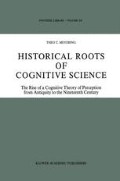Abstract
First philosophy as the foundation of all truth and wisdom must be epistemology. This is a notion so widely received that the philosopher of today tends to accept it as the common wisdom of his trade. For, surely, no proposition is admissible as knowledge unless rigorously tested. And it goes without saying that the branch of philosophy establishing these tests, thus formulating the criteria of knowledge, must, on pain of vicious circularity, be prior to, and proceed independently of, any material cognitive claims. First philosophy, therefore, provides no substantial knowledge. It is a purely formal discipline, necessarily critical and epistemological.
Access this chapter
Tax calculation will be finalised at checkout
Purchases are for personal use only
Preview
Unable to display preview. Download preview PDF.
References
Cf. Kenneth Dorter, ‘First Philosophy: Metaphysics or Epistemology?’, Dialogue 11,1 (Mar. 1972), p.3.
Note that the proposition of God’s existence is presented as a theorem within the Cartesian theory of knowledge, not as an unproven premise supported by faith and revelation. This, of course is a highly contentious issue which up to the present day has been the subject of animated discussion directed at the so-called problem of the Cartesian circle. Yet, whatever the merits of the Cartesian argument, it is clear that the edifice of knowledge in Descartes’ view is built upon the Cogito and the powers of a self-reflective mind, that is, on critical epistemology rather than on inspired theology. For the philosophical problems surrounding the Cartesian circle, cf. Alan Gewirtz, ‘The Cartesian Circle’, Philosophical Review L, 4 (July, 1941) pp. 368–95
id., ‘The Cartesian Circle Reconsidered’, Journal of Philosophy 67, 19 (Oct. 8, 1970) pp. 668–85
Anthony Kenny, ‘The Cartesian Circle and the Eternal Truths’, ibid., pp. 685–700
Harry G. Frankfurt, Demons, Dreamers and Madmen: The Defense of Reason in Descartes’ Meditations, (Indianapolis, 1970), esp. ch. 15.
Discourse on Method, E.S. Haldane and G.R.T. Ross (trs.), The Philosophical Works of Descartes, 2 vols., (Cambridge, 1911–1912; corrected ed., 1931; paperback ed. New York, 1973), I, pp. 81–2. This edition will be referred to below as HR.
Only propaganda on behalf of the new science, and of the new common sense that came along with it, would present the objects and their real natures as manifest, manifest to reason, for example, or manifest to the expert practitioner of mathematically interpretable experiments. The latest victim of this propaganda seems to be Sir Karl Popper who takes the era since the Scientific Revolution to be decisively characterized by the doctrine that truth is manifest [cf. K. Popper, Conjectures and Refutations, (London 1963) p. 5].
Cf. Kenneth Dorter (1972), p. 17.
The Scholastics regarded lumen as the species of lux, that is, as the representation of lux in the medium by means of which lux is seen. By contrast, lux is a fixed property of a luminous body. According to Jean Buridan (fl. ca. 1330), in order that color is seen lumen and the species of color must act together: “lumen and (the species of) color are sufficient for affecting vision and impressing in it species sufficient for vision”. (Questiones et decisiones physicales insignium virorum, George Lockert (imp.), (Paris, 1518), fol. 14va; quoted in David C. Lindberg, Theories of Vision from al-Kindi to Kepler, (Chicago, 1976, p. 133). He goes on to argue, rather crudely, that as perception does not occur through the reception of the object itself it is the reception of its species in sense or the organ of sense which constitutes perception (ibid., fol. 19rb).
Clearly, in the Scholastic account of vision the ‘subjective’ and the ‘objective’ manifestations of light are not at all distinguished as such either ontologically or methodologically. Vasco Ronchi has drawn attention to this aspect of medieval theories of vision and to its contrast with modern conceptions (cf. his Optics, The Science of Vision, (NY University press, 1957), esp. ch. I.). However, Ronchi’s account of the ancient and Scholastic concepts of lux, lumen, species and color and their theoretical and philosophical underpinnings seems a little confused at times (cf. esp. pp. 14–5, 17–9, 32). For an incisive criticism of a central doctrine of Ronchi’s work, cf. David C. Lindberg and Nicholas H. Steneck, The Sense of Vision and the Origins of Modern Science’, in Science, Medicine and Society in the Renaissance, Essays to Honor Walter Pagel, Allen G. Debus (ed.), (New York, 1972).
Cf. Thomas S. Kuhn, ‘Mathematical versus Experimental Traditions in the Development of Physical Science’, The Journal of Interdisciplinary History, 7 (1976), pp. 1–31.
Cf. I. Lakatos, Tarification and the Methodology of Scientific Research Programmes’, in Criticism and the Growth of Knowledge, I. Lakatos and A. Musgrave (eds.), (Cambridge 1970), pp. 91–196.
Cf. K. Popper, Conjectures and Refutations, (London 1963), p. 14, n. 2.
Cf. Descartes, HR I 81–2.
S. Grossberg, Studies of Mind and Brain, Neural Principles of Learning, Perception, Development, Cognition, and Motor Control, (Reidel, 1982), p. 3.
Ibid., p. 634.
Author information
Authors and Affiliations
Rights and permissions
Copyright information
© 1989 Kluwer Academic Publishers
About this chapter
Cite this chapter
Meyering, T.C. (1989). Introduction. In: Historical Roots of Cognitive Science. Synthese Library, vol 208. Springer, Dordrecht. https://doi.org/10.1007/978-94-009-2423-9_1
Download citation
DOI: https://doi.org/10.1007/978-94-009-2423-9_1
Publisher Name: Springer, Dordrecht
Print ISBN: 978-94-010-7592-3
Online ISBN: 978-94-009-2423-9
eBook Packages: Springer Book Archive

